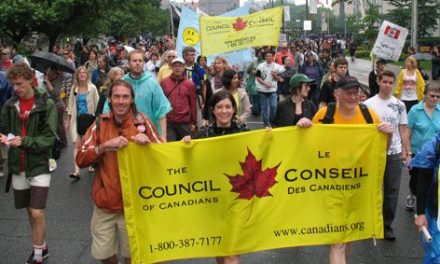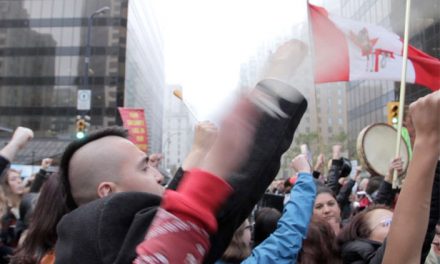On June 6, 29 Canadian civil society organizations, coalitions, and unions, including Common Frontiers, sent a letter to Prime Minister Mark Carney calling for a reset on the Canada-Ecuador trade deal to ensure that it is consistent with his government’s promises to prioritize protection of human rights and the environment.
The letter echoes the deep concerns repeatedly expressed by Indigenous and environmental organizations in Ecuador and urges the government not to implement a highly problematic, last-generation free trade agreement that was negotiated with Ecuador by the Trudeau government and that aims to increase Canadian mining investment in the Andean nation.
The full letter is below and is available in English, French and Spanish.
June 6, 2025
The Right Honourable Mark Carney
Prime Minister of Canada
Office of the Prime Minister
80 Wellington Street
Ottawa, ON K1A 0A2
cc: The Honourable Maninder Sidhu, Minister of International Trade
The Honourable Anita Anand, Minister of Foreign Affairs
Dear Prime Minister Mark Carney,
Re: Reset needed to ensure Canada-Ecuador trade deal is consistent with promises to prioritize protection of human rights and the environment
Please accept our congratulations on your recent election victory and appointment as Canada’s new Prime Minister.
These are difficult, risky times. We respect your stated commitment to put Canada’s foreign relations on a more just foundation and stand up to U.S. threats. We could not agree more that this is a “hinge” moment marked by extremely dangerous challenges to peace, security, democracy, the rule of law, human rights and a healthy environment at home and abroad.
We share your hope that Canada can play a constructive and potentially transformative role internationally, to meet sovereign nations on equal grounds and forge agreements that guarantee civil, political, social, economic and environmental rights in all countries.
We agree with you that Canada must diversify its trade relations to buffer against risks emanating from the White House. The reset we need is one that ensures any new trade agreements undertake due diligence, in line with UN standards and recommendations, to ensure full compliance with human rights obligations, including the rights and sovereignty of Indigenous peoples and the right to a healthy environment.
Canada’s inclusive trade agenda must be reinforced and meaningfully expanded, not cast aside for politically expedient last-generation trade deals.
It is for these reasons that we urge your government not to implement a highly problematic free trade agreement that was negotiated with Ecuador by the Trudeau government in 2024, aimed at increasing Canadian mining investment in the Andean nation. Indigenous and environmental organizations have expressed deep concern that it will exacerbate a dire human rights situation and pose a threat to ecologically sensitive areas of the country.
In October 2024, Canadian organizations hosted a visit to Canada by leaders of Indigenous and environmental organizations in Ecuador who met with government representatives and MPs to share disturbing testimony of human rights violations linked to Canadian mining projects. They described gender impacts of Canadian investment, disregard by Ecuadorian officials and private companies for constitutional guarantees, and failures of due diligence with huge consequences for the Amazon, other precious sources of water and the communities that depend on them. The leaders called on Canada not to sign any deal unless Indigenous peoples in Ecuador give their free, prior and informed consent, a recommendation also made by the House of Commons Trade Committee in its June 2024 report to the Trudeau government.
Yet there has been neither consultation with organizations representing affected Indigenous peoples in Ecuador, nor their consent.
The Ecuadorian defenders also expressed deep concern that the governments of both Canada and Ecuador have sought to include investor-state dispute settlement (ISDS) provisions in the free trade agreement, even though a huge majority of Ecuadorians voted in a referendum in April 2024 to maintain the unconstitutionality of ISDS in their country. UN reports warn of the catastrophic consequences of ISDS for human rights and the environment.
In October 2024, the leaders of six Canadian labour unions sent a strongly-worded joint letter to former Prime Minister Trudeau calling for a halt to the free trade negotiations and guarantees of rights protection:
We urge you to reconsider this trade agreement and to prioritize the protection of human rights, environmental sustainability, and the rights of Indigenous peoples. There must be a transparent and inclusive process that respects the voices and concerns of those most affected, including the Indigenous communities in Ecuador who have long resisted harmful extractive practices.
It must be noted that the Alliance for Human Rights in Ecuador, a coalition of respected human rights and environmental organizations, has reported that Canada’s trade negotiations with Ecuador advanced in troubling secrecy. The government of President Daniel Noboa violated the Escazu Agreement by taking action to prevent access to information by Indigenous peoples, campesinos, Afro-Ecuadorians, women, trade unions, environment and human rights defenders, and other citizens.
Equally disturbing, the Noboa government has sent the military into communities speaking out about the negative impacts of Canadian mining projects, and the president has enacted executive decrees to limit the right to participation in environmental decision making processes, in violation of international standards. Since 2023, over 100 environmental defenders have been criminalized for peacefully protesting against Canadian mining projects in the country. President Noboa’s family stands to gain directly from opening up the Amazon to more mining, leading to accusations of conflict of interest in Ecuador.
Given these realities, we trust that the much-needed change you have promised will mean a reset on Canada’s trade negotiations with Ecuador. At a minimum, no agreement should move forward without meaningful consultation and the free, prior and informed consent of affected Indigenous Peoples. There must also be legislated mechanisms in Canada to hold Canadian corporations accountable for human rights violations. Finally, the deal must not include an investor-state dispute settlement process of any kind, as ISDS has been rejected by the Ecuadorian people.
We would welcome the opportunity to discuss these urgent matters with you and your ministers as soon as possible.
Sincerely,
-
Alternatives International
-
Americas Policy Group (APG) – Groupe d’orientation politique pour les Amériques
-
L’Association québécoise des organismes de coopération internationale (AQOCI)
-
Atlantic Regional Solidarity Network (ARSN)
-
Attac Québec
-
Canadian Center for Policy Alternatives (CCPA)
-
Canadian Labour Congress (CLC)
-
Canadian Union of Public Employees (CUPE)
-
Centre international de solidarité ouvrière (CISO)
-
Codevelopment Canada
-
Comité pour les droits humains en Amérique latine (CDHAL)
-
Common Frontiers
-
Conseil central du Montréal métropolitain – CSN
-
Grandmothers Advocacy Network
-
KAIROS: Canadian Ecumenical Justice Initiatives
-
Le Groupe de Recherche Interdisciplinaire sur les Territoires d’Extractivisme (GRITE)
-
Journal des Alternatives
-
Le Lagopède
-
Maquila Solidarity Network (MSN)
-
Mining Injustice Solidarity Network (MISN)
-
MiningWatch Canada
-
National Union of Public and General Employees (NUPGE)
-
Observatoire violence, criminalisation et démocratie
-
Public Service Alliance of Canada (PSAC)
-
Réseau internationale pour l’innovation sociale et écologique
-
Trade Justice Group of the Council of Canadians
-
Trade Justice Network
-
United Steelworkers
-
UNIFOR



